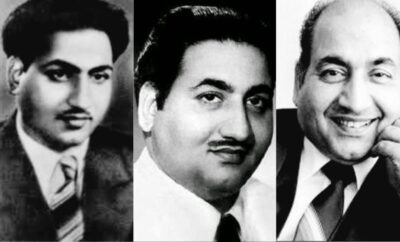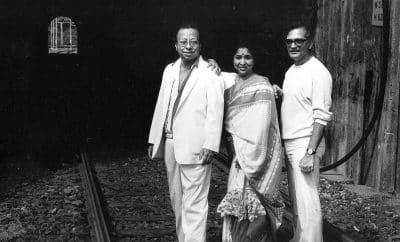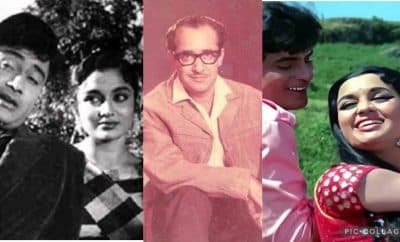People
I would love to do a negative role – Sumeet Raghvan
Lambi lambi taangon waala
Tez dimaag waala
Ye Faster Fene hai
Faster Fene hai
Fa Fe, Fa Fe, Fa Fe…
Indian Television 1980s. All those who have watched tv in the mid 80s will readily connect with this catchy song. Some of you might also get the visuals in front of your eyes. Faster Fene, our own desi detective and his stories kept us glued to our television sets back in the 80s. A lanky, smart boy with hair falling on his forehead, an intelligent face and a charming smile. That’s the image we have in our mind when we say Faster Fene. This image was brought alive in front of our eyes when actor Sumeet Raghvan poured his soul into the character. From then on Sumeet Raghvan became a household name. Be it an awkward teenager in Mahabharat playing the role of Sudama or the very dutiful husband in Sarabhai vs Sarabhai, Sumeet Raghvan has lived every role. Sumeet loves the camera and the camera loves him. From FaFe to Wagle ki Duniya, he has been there, done that. Television, theatre, films et al. And in almost 40 years of his career, what an asset this actor has been to the Indian audience.
Absolutely delighted to interview this gem of an actor who is also an amazing human being.
TheSongPedia in conversation with Sumeet Raghvan.
(Along with the songs picturised on him we have also posted the songs of his choice. Hope you enjoy all of them).
TheSongPedia (TSP) – Most of us know you as (and from the DD serial) Faster Fene. Tell us something about your pre FaFe days. Your childhood, your parents. When did acting come in your life?
Sumeet Raghvan (SR) – I always had a flair towards art. I loved to sing. During my school days, I used to get requests for singing, from teachers and students alike. So whenever there was a free period I would be hopping around the classes entertaining them with my songs. If teachers asked for a Marathi song, the students would ask for Hindi songs and so a series of Farmaish would go on. It was during this time (late 70s/early 80s) that Shankarabharnam was released. So I used to also sing all the Tamil/Telugu songs from the film. Mahalaxmi Iyer was my classmate and we both were famous for singing and entertaining. Even if I did all this, I was an introvert. So my parents wanted me to go out a bit, mingle with people and express myself more. They enrolled me in a children’s workshop. This workshop for acting, Avishkar, was conducted by the actor couple Sulabha and Arvind Deshpande. My parents tried everything they could without thrusting anything on me. They always encouraged me. Burned a hole in their pocket. I had a flair towards mimicry (I used to mimic actors). I also had flair for dancing, so my dad used to take me for western dance while my mom used to take me for Bharatnatyam classes. I will always be grateful to them for being understanding towards me, my brother or even understanding our needs. It is very important for a parent to know the needs of his/her child. For me my parents are next to God. They have been my backbone.
TSP – Was it always your wish to become an actor? Who has been your inspiration then and now?
SR – After my parents enrolled me for the Avishkar workshop, things started improving. I used to sit with children of my age, started interacting with them. Our instructor there was Ramnath Tharwal, who was excellent with children. He knew how to go about with them. He used to give us some weird situations and ask us to close our eyes and imagine the situation and then ask us to enact or to talk about it. That’s how I started to open up slowly. But apart from this I had all the options in front me. I had to choose – acting, dancing, singing. Just then I had an opportunity to act in the DD serial Srikant, starring Sujata Mehta and Farooq Sheikh. It was a minuscule role, just for a fleeting moment. But that made me realise that I loved acting. I fell in love with the camera (and of course the camera too fell in love with him). Since then it has been almost 39-40 years now that I’m in front of the camera. Inspirations have kept on changing with all those years. From Charles Chaplin to Amitabh Bachchan to Kamal Haasan, my dad and mom have been an inspiration. Even Tom & Jerry have inspired me. I’ve always felt that dialogues are not important, reactions are important. I might be wrong, but that’s what I think. I always get a lot of ‘kick’ in reacting. Be it Sahil Sarabhai or Rajesh Wagle or even ad films, reacting has been fun. Even if people have loved and talked about an actor who is good with emotions or emotional scenes, for me the one who makes you laugh is the best actor and nobody can be bigger than Charles Chaplin. Even if you see the comic timing of Amitabh Bachchan or Kamal Haasan, you will understand. It is very easy to make people cry, it is very difficult to make them laugh. And of course, my mom and dad because as an actor I work for a few hours but for the rest of the day I’m Sumeet Raghvan. So how to conduct yourself as a human being is more important than how you are as an actor. I always feel that you owe so much to society. I always feel you get so much from society, you have to repay. Not in terms of money but by becoming a law abiding, tax paying citizen.
TSP – How did FaFe happen? Was it your first television appearance? If so, how was the experience? Especially when people started recognising you.
SR – As I told earlier, I was doing a workshop with Sulabha and Arvind Deshpande and one day Sulabha maushi asked me if I have read Faster Fene (the book) and I hadn’t. So she gave me a few books of Faster Fene and asked me to read. I looked at the front cover of the book and she asked me – “Doesn’t he look like you? I want you to do this role, will you do it?” And that’s how I got the role. Arvind Deshpande, we all called him Pappa, was supposed to direct the series but unfortunately he passed away. His dream was later carried forward by Sulabha Deshpande, his wife, who directed the series. I’m really fortunate to know all these great people – Sulabha Deshpande, Prabhakar Panshikar, Mohan Wagh, Dr. Sriram Lagoo etc. So FaFe became my first major television appearance and people started recognizing me. It was because of FaFe that I became a household name across the country. I still remember one of our family friends, Dhananjay Wani, who was a fighter pilot and was posted in Kashmir. He had come to Mumbai and appreciated my work by saying – your serial is a hit. All small children at our place (in Kashmir) sing that title song often. And I was so elated to hear that.
TSP – You have done theatre, television and films. Which one has been most satisfying for you? As compared to theatre and television, films came quite late in your life, why?
SR – Wherever I get good money (laughs)!!! Jokes apart, I have been very choosy and picky about my roles. But I feel that shelf life of an actor is very less. Like the saying goes – This body is like an instrument and it is upto you how you play it. I think that over exposure also kills an actor. So one should choose the work diligently, with utmost care. Yes, I have dabbled with films, theatre plays have been my love but I feel that it is the television where I really enjoy. And I would always like to work in a zone where I’m comfortable. And I like to stick to one production house, for eg, Hats Off Production. I have done Sarabhai with them, Badi Duur Se Aaye Hain, now I’m doing Wagle ki Duniya. So its like my second home. And comparatively, films came quite late. When I wanted to do films there were already legends like Ashok Saraf, Laxmikant Berde, Sachin Pilgaonkar ruling the roost. In the mid or late 80s, when I was in my teens, I was offered roles like that of a 4th hero. And I felt I would be almost nothing in front of these legends. I stayed away from the films. Of course I tried for Hindi films too. I did one in 1991, but that film still hasn’t seen the light of the day. And finally in 2014, at the age of 43, I did a Marathi film called Sandook. It was made by my friend and I happily agreed to do it. Then there’s Aapla Manus with Nana Patekar, Bucket List with Madhuri Dixit, Sumitra Bhave’s Welcome Home, Ekda Kaai Zaala with Dr. Saleel Kulkarni. I also did Ani Dr. Kashinath Ghanekar where my role of Dr. Lagoo was small but an important one. It was also well appreciated. I have worked in several short films too, in fact, I have also directed a short film – Quarantune 2020.
TSP – Ever thought of dabbling with the South cinema?
SR – I don’t think so. Not that I cannot. But I think I’m a bit of a laid back person. You can also say I’m a lazy person. I never had that instinct in me to go upfront and ask people for work. Possibly it’s my biggest drawback. Probably, it has also made a big dent in my career. I would have been somewhere else today. But personally I’m okay, I’m happy and content and satisfied. At the same time I’m keeping the actor in me hungry and alive so that it doesn’t show in my performance.
TSP – Was there ever a time when there was a lull in your career? How did you handle it?
SR – From 1991 to 1997/98. I had negligible or no work. It was a very low patch. I could have gone haywire, I could have gone into the wrong company and wasted my life. That’s the period where you are most vulnerable. You don’t have anything to do nor any hope of work in the future. The horizon looks dark. But here too my parents came to the rescue by setting an example. My father has really done so much for us children. He too had a similar phase in his life but he did not let that phase reach us. Every morning he used to leave the house at 9 to his friend’s office in town, sit the entire day there and then return in the evening. And we children thought he went for work as usual and came back in the evening. It was quite later that we understood the gravity of the situation. I had the biggest example in front of me. My father is my Superman.
TSP – What are your future plans? Any genre in particular which you would like to act in?
SR – I’m not very keen about any genre in particular. But I would absolutely love to do a negative role. Because people take these characters at face value. So that could be the biggest advantage for me. Just like, for example, we had Ashok Kumar in Jewel Thief!!
I hope some director reads this interview and casts me in a negative role (laughs). But any kind of role which proves pivotal in the story, it may not be the lead role, like I played the role of Dr. Lagoo. Screen time of that role was not more than 10 minutes in the entire film, but it made an impact. The role should excite me as an actor.
TSP – Have you ever thought of conducting your own talk show?
SR – I have already done a talk show called Jai Hind on the internet. It was an online TV show and that didn’t do well during its relay days. But I would certainly love to do a talk show in future on any topic, say politics, sports, varied subjects. I connect well with the people and it is a good idea.
TSP – How do you see Indian television 10 years from now? With the attention span of viewers becoming less, what do you think about the TV series which have a few hundred episodes?
SR – Indian television was there and Indian television will be there. Actors like me will always be there for Indian television. It gives a lot of good content and substance so it will sustain. Except for the Naagins and Saas Bahus, I think there are many things which Indian television is capable of. There’s Wagle ki Duniya, Sarabhai or Badi Duur Se Aaye Hain. Why am I talking about my shows? Because I feel it has made some mark with the audience.
TSP – What is your opinion on OTT platforms? Do you think it is taking away the audience from the television?
SR – I don’t think so. I feel that television has got its own loyal audience. Moreover, television channels now themselves have their own platforms. So the content is going to be there always.
TSP – Tell us something about your bond with music. How did it start? Have you been learning music since childhood?
SR – I used to sing jingles as a child. Uncle Balu (Mr. Balchander),my dad’s friend, was from the ad world. It was with his help that I got those jingles. But then my parents thought I should get a good classical base. So that’s how I started to learn classical from Pandit Vasantrao Kulkarni and Pandit Surendranath. Singer Padma Menon used to sing jingles with me and she suggested that I learn from Suresh Wadkar. Then for 3-4 years I learnt music from Suresh Wadkar.
But music took a back seat during my career as an actor.
TSP – Since you sing well, have you ever thought of singing as a career?
SR – Unfortunately no. My singing now is restricted to my make up room only. Honestly speaking, a career in music is not a ‘by-the-way’ thing to do. I have lost a lot of ground now. With age, voice also ages, shakes. You need to do a lot of riyaaz. Also, I’m a very good listener. I’m happy and content listening to all songs which our yesteryear music directors, singers, lyricists have left for us. A legacy of sorts. A lifetime will fall short listening to all those numbers.
TSP – Who is your fav music director?
SR – It is very difficult to choose. It also depends upon the mood. All of them are special but I’ll be very biased here – Pancham (R D Burman) is my favourite music director. By saying that I know I’m not doing justice to the greats like Hemant Kumar or SJ or S D Burman. But when I think about what would it have been like if there was no Pancham and his music in my life, I realise the importance. If we look at the success rate through songs, Dada Burman was way ahead. Almost all his songs are super hits. But still I feel there’s something magical about Pancham’s music. He was a real game changer.
TSP – If you were a professional singer, under whose baton would you have loved to sing?
SR – Of course Pancham! (Laughs)
Apart from him, I would have loved to sing for Dada Burman and Roshan. Roshan saab remained underrated despite giving so many beautiful numbers. Any song you pick and it is fabulous.
TSP – Tell us some of your fav songs. At least 5.
SR – My top 5 –
Tere mere sapne (Guide)
Abhi na jao chhodkar (Hum Dono)
Zindagi bhar nahin bhoolegi (Barsaat ki Raat)
Yun hasraton ke daag (Adalat)
And Pancham? Where do I begin with?
An underrated gem – Beeti na bitai raina (Parichay)
TSP – Your message for our readers.
SR – We have always been following the saying – Don’t believe all that your hear. But now I will add – Don’t believe in whatever you see too. Be very choosy, be very careful. Don’t react. Let it seep in. Think about it and only then react if it is worth reacting. Times have changed and we need to take a break from reacting. There are some things which absolutely don’t need your attention. And keep on listening to Pancham (laughs), keep on listening to good music.



